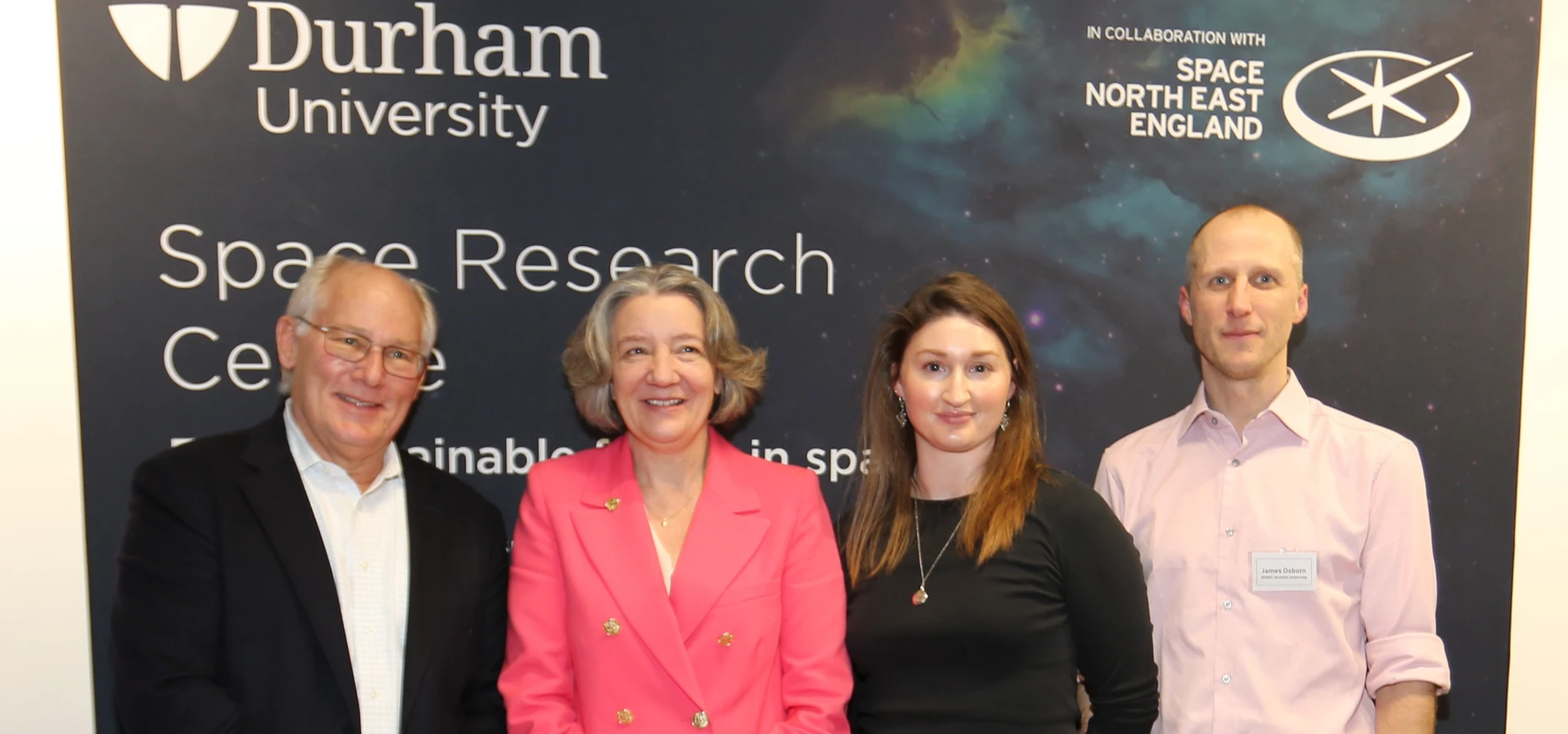
Durham University unveils £5 million space centre
A cutting-edge research centre has opened in the North East, aiming to drive innovation and sustainability in space exploration while strengthening the region’s growing space industry.
Durham University has launched the £5 million Space Research Centre (SPARC), designed to advance scientific discovery, business development and space law, while nurturing a talent pipeline for the space sector.
The centre brings together expertise from the university’s physics, law, computer science, government and international affairs departments, as well as the Durham University Business School, to address the challenges of sustainable space exploration.
Dr. Andrew Aldrin, son of Apollo 11 astronaut Buzz Aldrin, who is associate professor and chair of the Master of Sciences Space Systems, and the Master of Space Operations programmes at Embry-Riddle Aeronautical University, USA, delivered a keynote speech at the launch event, which also featured representatives from the European Space Agency (ESA), Professor Karen O’Brien, Durham University vice-chancellor, and councillor Amanda Hopgood, leader of Durham County Council.
Dr Aldrin said: "The space community has got to get out of its cosmic cocoon. We will be most successful when terrestrial industries just think of space as another place to find partners.
“Industry engagement is essential to ensuring the long-term sustainability of space exploration.
“By working with sectors such as advanced manufacturing and semiconductors, we can accelerate the commercialisation of space, turning research into practical technologies that benefit society and drive economic growth.
"A collaborative approach not only expands opportunities within the space sector but also establishes the foundation for responsible and enduring space innovation."
SPARC will collaborate with commercial partners and government agencies, including NASA, ESA and the UK Space Agency, while helping to expand the region's space workforce from 3,000 to a projected 10,000 roles by 2030.
Durham University was also announced as an ESA Laboratory, enhancing its access to international research collaborations, state-of-the-art facilities, technology transfer opportunities, student exchange programmes and funding opportunities.
This will provide greater opportunity for other academic institutions and industry to collaborate with Durham and access the university’s expertise and facilities in instrumentation, such as telescopes.
Durham’s Centre for Advanced Instrumentation, based at NETPark, in Sedgefield, County Durham, already builds components for some of the world’s biggest telescope and satellite projects.
Professor James Osborn, director of the Durham University Space Research Centre, said: “Durham’s research and expertise is world-renowned for furthering our understanding of space and enabling the exploration of the cosmos through cutting edge technological development.
“We are building on that heritage and stretching out into space business and operations, space governance and international relations.
“Space is a rapidly growing sector which supports our improving quality of life and protecting our planet.
“Now is the time to develop technology and ideas for a sustainable future in space and the establishment of SPARC and our ESA Lab status will support us in achieving this.”
The event also served as the launch of Light Years, Durham University’s art and space science project, which sits within the regional Into The Light Place Partnership, led by Durham County Council.
Light Years enables Durham University to share its space research and expertise with the public while inviting local communities to engage with SPARC through creative and accessible initiatives.
Councillor Amanda Hopgood, who attended the event together with Alison Clark, the council’s head of culture, sport and tourism, said: “It’s really exciting to be launching something as ambitious as SPARC right here in County Durham and the wider North East.
“Our county has had a connection with space dating back 1,200 years, to the days of Venerable Bede and his Lunar Calendar; and today we are home to the North East space cluster at our North East Technology Park at Sedgefield.
“It’s brilliant to strengthen that connection through this new Durham University facility and we’re also really looking forward to the Light Years project bringing this fascinating subject to more people in the county as part of our Into the Light Place Partnership.”
Durham University was named a key partner in the new £2.5 million North East Space Communications Accelerator (NESCA) recently, which will launch in 2025.
The initiative brings together Northumbria, Durham and Newcastle universities, the North East Combined Authority, Space North East England, the North East Space Leadership Group, and 14 industry partners, all working together to bolster the region’s space sector.
Looking to promote your product/service to SME businesses in your region? Find out how Bdaily can help →
Enjoy the read? Get Bdaily delivered.
Sign up to receive our daily bulletin, sent to your inbox, for free.








 Navigating the messy middle of business growth
Navigating the messy middle of business growth
 We must make it easier to hire young people
We must make it easier to hire young people
 Why community-based care is key to NHS' future
Why community-based care is key to NHS' future
 Culture, confidence and creativity in the North East
Culture, confidence and creativity in the North East
 Putting in the groundwork to boost skills
Putting in the groundwork to boost skills
 £100,000 milestone drives forward STEM work
£100,000 milestone drives forward STEM work
 Restoring confidence for the economic road ahead
Restoring confidence for the economic road ahead
 Ready to scale? Buy-and-build offers opportunity
Ready to scale? Buy-and-build offers opportunity
 When will our regional economy grow?
When will our regional economy grow?
 Creating a thriving North East construction sector
Creating a thriving North East construction sector
 Why investors are still backing the North East
Why investors are still backing the North East
 Time to stop risking Britain’s family businesses
Time to stop risking Britain’s family businesses